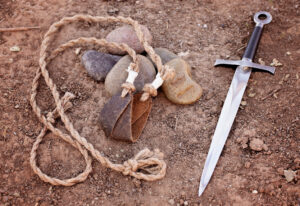The Sword Shall Not Depart
King David had his ups and downs when family and politics mixed. As a youth, he defeated Goliath in single combat and came to the attention of Saul, the king. As he gained notoriety and fame, he married the daughter of King Saul, Michal, with the bride-price of a hundred Philistine foreskins; David brought two hundred (1 Samuel 18:25-27). When Saul became publicly intent on killing David and David fled into the wilderness (with Michal’s help), Saul gave his daughter to another man to be his wife. After Saul was killed in battle and David became king, Michal was returned to him. But she ridiculed David for dancing before the Lord and as a consequence she was childless (2 Samuel 6:16-23).
Robert Bergen noted in his commentary on 2 Samuel that an audience knowledgeable of the Torah would see Michal’s childlessness as a curse against a disobedient wife, and not as evidence of David’s failure to sleep with her. “Michal’s lack of faith would mean that the house of Saul would be forever separate from Israel’s eternal royal dynasty.” But David had other wives and while he reigned as king in Hebron, he had six sons by six different women: Amnon, Chileab, Absalom, Adonijah, Shephatiah and Ithream (2 Samuel 3:2-5). Solomon, who would be king after David, was born later in Jerusalem, along with Shammua, Shobab, Nathan, Ibhar, Elishua, Nepheg, Japhia, Elishama, Eliada and Eliphlet (2 Samuel 5:14), and the unnamed son born to Bathsheba before Solomon. So, how was it that Solomon, and not one of his older half-brothers could become the king of Israel after David?
Given the custom of primogeniture, Solomon would have several older male siblings with, perhaps, a perceived stronger claim to the throne—particularly those who were born in Hebron. According to The Baker Encyclopedia of the Bible, the term primogeniture refers to the exclusive right of inheritance that belonged to the firstborn male. However, if the firstborn died, the next oldest living male did not automatically receive that exclusive right. Exceptions could be made by the family patriarch, who in this case was David, if he chose to do so.
Applied to David’s family tree, Amnon had the right of primogeniture. But he was killed by Absalom, apparently in revenge for Amnon’s rape of Tamar, Absalom’s sister (2 Samuel 13:22; 28). It may also have been politically motivated. Chileab, the second born so to David, may have died in infancy, which would have then made Absalom next in line to be king after Amnon. David’s favoritism towards Absalom, even after his assassination of Amnon, seems to suggest Absalom was David’s initial choice to rule after him. However, Absalom’s attempt to usurp the throne from his father, and Joab’s killing of Absalom, eliminated him (2 Samuel 18:14-15).
That left Adonijah as the next in line, but it seems David exercised his right as the family patriarch and said Solomon, not Adonijah, would be king after him. Apparently, this did not sit well with Adonijah, because when David was old and advanced in years, he aligned himself with Joab and Abiathar the priest, and declared himself king. But this coup did not happen. Nathan and Bathsheba told David about Adonijah’s plans. He affirmed his promise to Bathsheba that her son Solomon would be king after him and arranged for a clear transfer of power to Solomon (1 Kings 1:5-48).
Because of his failed attempt to become king, Adonijah was afraid Solomon would kill him. But Solomon said if Adonijah proved himself to be a worthy person, nothing would happen to him. Yet Solomon warned in 1 Kings 1:52, “If wickedness in found in him, he shall die.” Adonijah did not prove himself to be a worthy person and tried to gain Abishag, David’s last concubine, as his wife. Moreover, he tried to draw Bathsheba into his scheme by petitioning her to make the request of Solomon. Bathsheba agreed to go to Solomon and speak in behalf of Adonijah.
Some commentators have misjudged Bathsheba believing she was “rather stupid,” with the implications of Adonijah’s request for Abishag escaping her. But in his commentary, Paul House reasoned that Bathsheba did realize he was trying to use her. Whoever possessed the former king’s harem, controlled the kingdom, as Ahithophel counseled Absalom to do is his failed coup against David (2 Samuel 16:21-22). She knew Solomon would see Adonijah’s deceitful request as part of another attempt to gain the throne. Solomon saw Adonijah’s gambit for what it was and had him put to death for his wickedness (1 Kings 2:13-25).
Bathsheba was not a stupid, naïve woman. She was the daughter of Eliam as well as the wife of Uriah (2 Samuel 11:3). Eliam seems to have been the son of Ahithophel the Gilonite (2 Samuel 23:34), meaning she was Ahithophel’s granddaughter. Ahithophel was originally an advisor to David, but then aligned himself with Absalom in his failed coup (2 Samuel 16:23). Could this reversal be attributed to Ahithophel seeking revenge against David because he committed adultery with his granddaughter and then had her husband, Uriah killed in his attempt to cover it up? As prophesied by Nathan, the actions of Amnon, Absalom and Adonijah seemed to all be “part of the evil raised up from David’s own house”:
“‘Now therefore the sword shall never depart from your house, because you have despised me and have taken the wife of Uriah the Hittite to be your wife.’ Thus says the Lord, ‘Behold, I will raise up evil against you out of your own house. And I will take your wives before your eyes and give them to your neighbor, and he shall lie with your wives in the sight of this sun. For you did it secretly, but I will do this thing before all Israel and before the sun.’” (2 Samuel 12:10-12)
Although God forgave David, there were ongoing consequences for his hard heart and willful, deceitful actions with Bathsheba and Uriah. Like life in a modern soap opera, the sword did not depart from David’s house. Sincere repentance does not necessarily expunge the consequences of our sin.



